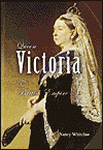Through the Looking Glass Children's Book Reviews
Queen Victoria and the British Empire
Nonfiction
For ages 12 and up
Morgan Reynolds, 2004 ISBN: 978-1931798297
She was just eighteen when she came to the throne and she had a lot to learn, but Victoria was determined that she would do her best and that she would work hard. Her first order of business was to remove her dead father’s former equerry from her household and to distance herself from her overbearing mother. She was not going to let either of these two people to influence her any longer.
Those who came to work for the petite queen soon found out that Victoria could be very stubborn and once she got an idea in her head, it was very hard to get her to get change her mind. Lord Melbourne, a political leader who advised her for many years, learned how to manage her very well by being very diplomatic, properly respectful of her position, and he was always kind and gentle with her. Other politicians made the mistake of being too brusque and their relationship with the queen was fraught with difficulties.
It is likely that Victoria would have had a very happy life had her much loved husband Albert not died at a reasonably young age. Victoria doted on Albert and when he died from typhoid fever in 1861 she spiraled down into a very depressed state which lasted several years. It would indeed be fair to say that she never really fully recovered from his loss. She did however get back on her feet enough to resume her duties as queen and in the end her reign lasted sixty-four years during which many landmark and historic events took place in the British Empire.
In this well written and carefully researched book, the author not only tells the story of one of the world’s most well known royal personalities, but she also describes what was taking place in the British Empire during Victoria’s reign. She sets the scene so that readers can see how troubled England was at that time because so many of her people were very poor, living in awful slums, and working in terrible conditions. She also describes, among other things, the Irish “problem”, the Crimea War, and the Indian uprisings.




